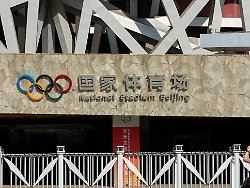Wednesday, April 7th, 2021
“Will not discuss”
USA are clear about the Olympic boycott
The White House is vehemently ending all speculation: The US wants to talk to its allies about a boycott of the 2022 Winter Olympics in Beijing. One statement shows how difficult the mixed sporting situation is.
The word of power comes from the highest authority – from the White House. The US will not boycott the Beijing Winter Olympics in 2022. “We have not and will not discuss any boycott with allies and partners,” said Jen Psaki, press secretary for US President Joe Biden.
A topic was ended that apparently wasn’t a topic at all. Ned Price was responsible for triggering the turmoil on Tuesday. The spokesman for the US State Department confirmed that because of the human rights violations in China, he and other nations would consider staying away from the Games (February 4th to 20th). It took less than 24 hours for a response from Beijing. The Chinese Foreign Ministry then announced that “it is against the Olympic Charter to politicize the sport.”
One statement reveals the whole explosiveness
At the same time, spokesman Zhao Lijian said the Americans later explained their statements and made it clear that they are not seeking a boycott. The US State Department put it similarly in a statement to the TV broadcaster CNBC. Jen Psaki then provided final clarity. Ned Price’s admission showed how fragile the political and sporting political situation is. Emotions boiled up.
The Olympic host China reacted pissed off and suspected political motives. The persecution of the Uyghurs, a Muslim minority, in the Xinjiang region in particular has repeatedly prompted calls for boycotts. China’s suppression of the democracy movement in Hong Kong is also a thorn in the side of the free world. Price spoke of “genocide” in the Xinjiang case. But he also emphasized that joint action with allies would have “more influence on Beijing” than would the United States go it alone.
Zhao called the genocide allegation “the lie of the century – from cover to cover”. The National and Paralympic Committee of the USA USOPC had also spoken out against a boycott. “We at USOPC reject boycotts of athletes because it has shown that they have a negative impact on athletes without tackling global problems effectively,” said USOPC President Susanne Lyons at a media conference for the US Olympic team.
The International Olympic Committee (IOC) had made it clear in March what it thought of a boycott when President Thomas Bach described such a boycott in the ARD Tagesthemen as the “wrong answer to such questions”. In February, the German Olympic Sports Confederation (DOSB) expressed concern about the human rights situation in China and declared that it wanted to prepare the athletes.
DOSB positions itself against boycott
However, DOSB President Alfons Hörmann also made it clear on Sky: “Any boycott activities, as the past has shown, bring little or nothing at this point.” Only the athletes would suffer from the boycott. “That cannot and must not be the right way,” said the CSU politician. After the 1980 Summer Games in Moscow, which the USA boycotted because of the Soviet Union’s invasion of Afghanistan, it would indeed be a relapse into times that were believed to be bygone for the world community.
Four years after Moscow, the Eastern Bloc stayed away from the Los Angeles games. Even before the summer games in Beijing 13 years ago, the conflict over Tibet had caused a stir, but the international community had not been able to bring itself to sanctions or even a boycott. In December, the human rights organization Human Rights Watch (HRW) wrote in an open letter to Bach: “The 2022 Games will take place under human rights conditions that are significantly worse than the 2008 Beijing Games.”
.
